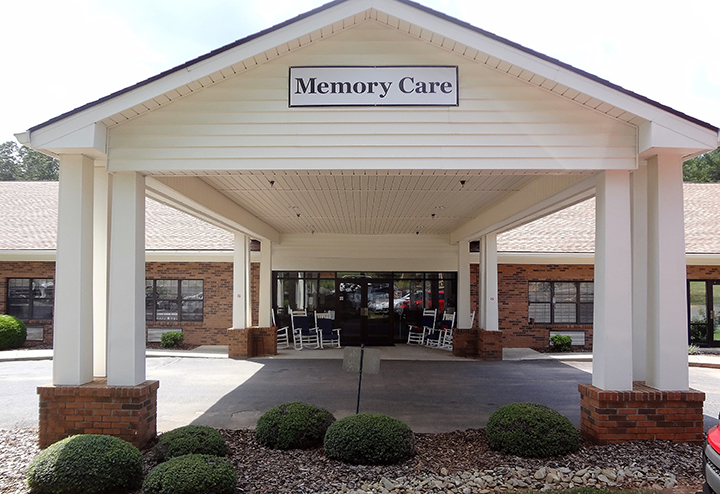Developing a Safe and Encouraging Environment for Alzheimer's Care
The development of a encouraging and secure environment for individuals with Alzheimer's is critical in enhancing their high quality of life. Checking out these complex strategies can disclose critical understandings into efficient caregiving methods that might change the daily experiences of both clients and caregivers.
Comprehending Alzheimer's Requirements
Frequently, individuals with Alzheimer's disease exhibit a range of needs that require tailored strategies to care. As the problem proceeds, cognitive decrease materializes in various means, impacting memory, thinking, and also the capability to carry out daily tasks. Caregivers must recognize these advancing demands to supply proper assistance and make sure a better of life for those influenced.
One critical aspect of comprehending Alzheimer's needs is identifying the relevance of routine and familiarity. Individuals typically discover convenience in well established patterns, which can minimize anxiety and complication. Caregivers need to aim to create organized everyday schedules that incorporate meaningful tasks aligned with the individual's rate of interests and capacities.
In addition, efficient communication is extremely important. People with Alzheimer's may struggle to reveal themselves or comprehend complex language. Caretakers must utilize straightforward, clear language, use non-verbal signs, and method energetic listening to promote understanding and link.
Lastly, social and emotional requirements can not be ignored. Supplying possibilities for social interaction and keeping connections can dramatically improve emotional wellness. Caretakers should motivate involvement in neighborhood activities or household celebrations, promoting a sense of belonging and function. Comprehending these diverse requirements is essential for creating a helpful treatment setting.
Designing a Safe Home
Producing a risk-free home for people with Alzheimer's illness is necessary to promoting and minimizing threats freedom. The layout of the living room must focus on safety and security while enabling personal comfort. Initially, get rid of prospective risks such as loose carpets, sharp items, and clutter, which can lead to drops or mishaps. Make sure that pathways are clear and well-lit, as correct illumination lowers disorientation and boosts movement.
Incorporating flexible features is likewise crucial. Mount grab bars in restrooms and near stairs, and think about using non-slip mats in damp areas. In addition, utilizing different shades for walls and floorings can assist in distinguishing areas, aiding to reduce complication.
Familiarity is very important for people with Alzheimer's. Personalizing the atmosphere with acquainted objects and photos can strengthen a feeling of belonging and safety - Alzheimers Care Charlotte. It is additionally advantageous to have actually a marked area for daily activities, such as analysis or crafting, which can give structure to their day
Finally, carrying out a safe and secure outdoor area enables for secure expedition while connecting with nature. By thoughtfully developing the home atmosphere, caretakers can significantly enhance the lifestyle for people dealing with Alzheimer's condition.
Enhancing Interaction Abilities

Non-verbal interaction, consisting of facial expressions, motions, and touch, plays an important duty in conveying empathy and understanding. Preserving eye call and a tranquil attitude can improve the comfort degree of the person, promoting a feeling of security.
Furthermore, it is very important to exercise active listening. This entails being fully existing, showing perseverance, and enabling the person to share themselves without interruption. Rep may be necessary; caretakers ought to be prepared to take another look at concerns or topics, as people with Alzheimer's might have a hard time with memory recall.
Additionally, utilizing visual help or cues, such as photos or acquainted items, can promote recognition and involvement. Eventually, boosting communication abilities is concerning developing trust fund and creating a setting where individuals feel listened to, valued, and understood, consequently enriching their high quality of life.
Urging Social Interaction
Promoting purposeful social interactions can substantially enhance the wellness of people with Alzheimer's disease. Engaging with others not only aids combat feelings of seclusion yet also promotes cognitive feature and psychological health. Structured social activities, such as team games, crafts and arts, or songs therapy, develop possibilities for locals to link with peers and caretakers, which can bring about boosted mood and lowered anxiety.
Developing an inviting atmosphere that encourages socialization is crucial. This can be achieved by organizing common areas that assist in communication, such as relaxing seating locations or activity areas. In addition, including familiar and culturally pertinent tasks can trigger memories and urge involvement, enabling individuals with Alzheimer's to feel more connected to their previous experiences.
In addition, caretakers need to be educated to acknowledge and promote social engagement among residents. Straightforward motions, such as starting conversation or helping with little group conversations, can aid people feel valued and included. Routinely scheduled social occasions must be constant yet flexible, accommodating differing levels of ability and passion. By focusing on social interaction, we can considerably enrich the lives of those visit this page coping with Alzheimer's, promoting a sense of area and belonging.
Sustaining Caregiver Wellness

To sustain caretakers, organizations ought to provide regular training and academic resources to improve their understanding of Alzheimer's condition and caregiving techniques. Offering access to break treatment solutions permits caretakers to take essential breaks, reducing tension and tiredness - Alzheimers Care Charlotte. Furthermore, cultivating an area with assistance teams can promote psychological sharing and the exchange of practical advice among caregivers, creating a network of mutual support
Psychological wellness sources, such as therapy solutions, can likewise be crucial in resolving the psychological toll caregiving can take. By focusing on caregiver well-being, we create a more lasting caregiving setting see this that not just benefits the caregivers themselves but also boosts the total top quality of treatment received by individuals with Alzheimer's. Inevitably, sustaining caregivers is a vital element in fostering a compassionate and reliable care setup.
Verdict
In final thought, the development of a helpful and safe environment for people with Alzheimer's is important to enhancing their quality of life. By focusing on security via thoughtful style, fostering psychological wellness with familiar components, and promoting engagement via structured routines, caretakers can dramatically affect the overall experience of those influenced by this condition. Sustaining caregiver health is vital, as it eventually adds to a more reliable and compassionate care setting.
Rep might be required; caretakers should be prepared to review concerns or subjects, as individuals with Alzheimer's may battle with memory recall.
